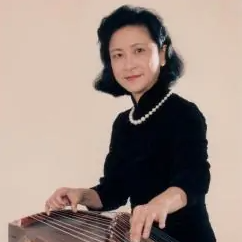Xiang Sihua

resume
Xiang Sihua, a contemporary Chinese zheng master who is well-known in the Chinese music circle and is well-known at home and abroad, was born in Shanghai in 1940. He specialized in piano in his early years, and later studied under the famous Zhejiang zheng master Wang Xunzhi, and learned other genres of zheng music from Cao Zheng and Guo Ying. He graduated from Shanghai Music Faculty of Ethnic Music. During the school, he first tried to play the double zheng, and he was well received.
After graduation, Xiang Sihua worked as a guzheng soloist in Beijing Film Orchestra, Shanghai Orchestra and China Opera and Dance Theatre, and taught at Beijing Central Conservatory of Music and China Conservatory of Music. He is a member of Chinese Musicians Association and director of Beijing Guzheng Research Association.
biography
In 1981, Xiang Sihua moved to Hong Kong. He is a director and permanent member of the Hong Kong Folk Music Society, a member of the Hong Kong Artists Union, a director of the Oriental Music and Dance Exchange Society, and a special performer of the Shanghai Chinese Ancient Orchestra. He teaches at the Chinese University of Hong Kong and the Hong Kong Academy for Performing Arts. , and won the honorary title of honorary professor of Jilin Academy of Arts. He is the author of two episodes "The Origin and Style of Chinese Zheng Music" and "Xiang Sihua Playing Chinese Zheng Music". In 2008, he also wrote "Xiang Sihua's Everyday Must Play Guzheng Finger Prelude Etude".
work
In the early 1980s, China Record Club and Japan's Toshiba EMI Co., Ltd. respectively published Xiang Sihua's guzheng collections "The Fishing Boat Sings Evening" and "Xiang Sihua's Famous Chinese Zheng Performance Collection". Special collection. "Xiang Sihua's Famous Chinese Zheng Performance Collection", supervised by Dr. Kishibe, an honorary professor at the University of Tokyo, Japan, also won the Japanese Ministry of Education, Culture, Sports and Arts Award. This recording, released in Hong Kong, has already surpassed the sales of gold albums, and it has become a classic recording of Chinese zheng music. After that, Hong Kong and Taiwan record production companies have published Xiang Sihua's albums, "Water Lotus", "The Moon in the Light", "The Light and the Moon" "High Mountains and Flowing Water", "Spring River, Flowers and Moonlight Night", "Liang Zhu" and "Song of the Countryside" and many other episodes.
She successfully performed the transposition zheng pieces "East Sea Fisherman's Song", "Thinking" and Peking Opera singing music "Wen Ji Returns to Han" on the reformation zheng. His playing style is simple, profound and delicate, full of charm.
evaluate
Xiang Sihua's zheng music achievements are highly praised at home and abroad: "her performance is meticulous and simple, her timbre is mellow and pure, and her style is fresh"; "she has temperament, skills, music, and characteristics"; "her performance in guzheng There is no sectarian view in the technique, but in the playing technique, the various zheng schools have adopted the advantages of various schools to form their own performance characteristics. It not only maintains the characteristics of the guzheng, but also expresses the style of modern music, which is full of music and thought. Image, artistic conception, and novelty"; "Xiang Sihua not only inherited the guzheng 'folk school' tradition but also raised the level of guzheng 'academic school' art. This is her successful attempt and her uniqueness. ”; Dr. Kishibe also believes that Xiang Sihua “has a more simple beauty”, “a gentle and kind personality, perhaps it can be said that this is exactly her musical performance itself.
Similar artist
Involving musical instruments
Involved portfolio
Involved news
Popular artists
- 01 Zhang Xiuyan
- 02 King Hammer
- 03 A Shicai
- 04 Li Muliang
- 05 Wang Jianmin
 渝公网安备 50010702504639号
渝公网安备 50010702504639号